When George W. Bush (born 1946) won a disputed election to become president of the United States, it capped a meteoric rise to power in a relatively short political career that combined good timing, a powerful family, and uncanny campaigning skills. A late bloomer in terms of achievement, Bush's victory represented the second time in American history that the son of a former president took on the world's most powerful political job. George Walker Bush was born in New Haven, Connecticut on July 6, 1946. His parents moved the family from New Haven, where they had lived next door to the president of Yale University, to Texas when George W. was two years old. His father, George Herbert Walker Bush, had just graduated from Yale and wanted to try his hand at the oil business. At first they lived in a ramshackle duplex in the roughneck town of Odessa, with two prostitutes renting the other half of the house. Two years later, after a brief time following the elder Bush as a drill-bit salesman in California, they moved to Midland, a more refined city that was better suited to raising a family. One of their neighbors, Charlie Younger, described Midland as "a real Ozzie-and-Harriet sort of town." It was also bursting with optimism during the boom times of the 1950s, when the elder Bush made his fortune in drilling. Young George W. was a strong-willed and wisecracking child who posed a challenge for his mother, Barbara. His father, who had played baseball at Yale, coached his Little League baseball team, and the young boy became a baseball fanatic, memorizing statistics and trivia from his collection of baseball cards. The Bushes had five more children: a son Jeb; a daughter Robin, (who died of leukemia in childhood); then sons Neil and Marvin and daughter Dorothy. As the eldest, George W. was expected to shine. He was an all-around athlete, fair student, and occasional troublemaker in school - he was once paddled for painting a mustache on his face during a music class. In seventh grade, he ran for class president and won. The next year, his father, who had become a millionaire, moved the family to Houston. Two years later, George W. was sent back East to enroll at Phillips Academy, an elite private prep school in Andover, Massachusetts. At Andover, he was a whirlwind of physical activity, playing varsity baseball and basketball and junior varsity football. In basketball he often made self-deprecating jokes about riding the bench. Instead of trying out for varsity football, he became the squad's head cheerleader. He also organized a stickball league and was nicknamed Tweeds Bush, after the political organizer Boss Tweed. Against the school's intense competition Bush arrayed his sense of humor. "I was able to instill a sense of frivolity," Bush later said. "Andover was kind of a strange experience." His high school academic record was far from top-notch. However, drawing on his family connections, Bush landed a spot at Yale, where both his father and grandfather had attended. Bush, extremely gregarious and a notoriously poor dresser, made many friends, somehow bridging the growing divide between the public school graduates who were entering Yale and the "preppies." Bush's interest in politics faded temporarily after his father lost a close election for a seat in the U.S. Senate, in which his grandfather had served. He remained uninterested in politics even after his father won the Senate seat on a second try in 1966. Instead, he became president of the Delta Kappa Epsilon fraternity and enjoyed parties, drinking, watching and playing football, and dating. Grades weren't a high priority. "He was a serious student of people," recalled classmate Robert McCallum. He was booked on a misdemeanor charge for being part of a prank that involved stealing a Christmas wreath for the frat house, but the charges were dropped. He was also questioned by police for helping to tear down the goalposts at Princeton University after a football game. For a brief time, he was engaged to a Rice University student, Cathryn Wolfman. In his senior year, he joined the notorious secret society, Skull and Bones. Despite his background of privilege, Bush became more at ease with all kinds of people in college. "I was never one to feel guilty," he said about his wealth and family connections. "I feel lucky." Moving back to Houston after graduating from Yale, Bush took up residence in a trendy apartment complex, the Chateaux Dijon - a hub for young single people. Cocky and loud, Bush played volleyball in the swimming pool, flirted with women, and drove a sports car. He worked, for a time, for an agribusiness company and for a mentoring program. "I was rootless," he later said. "I had no responsibilities whatsoever." Later, he would fend off reporters' questions about rumors of drug use in those days. "How I behaved as an irresponsible youth is irrelevant to this campaign," he said during his 1994 race for governor. "What matters is how I behave as an adult." Other questions later arose about how he had managed to avoid serving in Vietnam. He was a member of an elite Texas Air National Guard unit stationed at Ellington Air Force Base that included the sons of other prominent politicians and civic leaders. The National Guard had a long waiting list of young men eager to avoid military service during the war, but Bush managed to sail through easily. He has denied any impropriety, but political writer Molly Ivins claims that a family friend used Ben Barnes, then speaker of the House of Representatives in Texas, to recommend Bush for a spot in the Guard unit. Texas Oil Business Bush was rejected by the University of Texas Law School, but gained admittance to Harvard's Business School. After graduation, he retraced his father's footsteps and returned to Midland, Texas in 1975 to try his luck in the oil business. Bush started by searching deeds for other oilmen who wanted mineral rights. His first attempt at exploration, Arbusto Energy, failed to strike oil. In 1977 Bush suddenly announced that would run for a seat in the U.S. Congress. Asked later about his renewed interest in politics, Bush said it was because President Jimmy Carter was trying to control natural gas prices and "I felt the United States was headed toward European-style socialism." A friend set up Bush for a date with Laura Welch, a librarian. She had grown up near him in Houston and even lived at the Chateaux Dijon, but they had never crossed paths. Three months later, he married her and they immediately hit the campaign trail. In 1982, they would have twin daughters, Jenna and Barbara. In a primary, Bush prevailed over the Republican Party's handpicked choice, Odessa mayor Jim Reese, who portrayed him as an elitist and a liberal. Bush then faced off against Democrat Kent Hance, who painted him as elite East Coast carpetbagger whose $400,000 in campaign contributions came from well-connected outsiders such as baseball commissioner Bowie Kuhn. Bush played into Hance's hands by airing a campaign ad showing him jogging - an activity considered alien to many west Texans. Hance's campaign used a last-minute attack ad that accused Bush of having given free beer to college students in order to win their vote. Bush refrained from retaliating, and lost the election. Bush raised money from prominent family friends to support an oil drilling fund. However, Arbusto was still unable to find oil. He merged it with another company, Spectrum 7, which soon was three million dollars in debt. Many independent oil companies were going broke. Midland, the financial center of the Texas oil country, was in decline. Bush needed a miracle to survive in the oil business and was finally bailed out by Harken Oil and Gas (later Harken Energy Corporation). Harken wanted the name of the vice-president's son on its board of directors so badly that it assumed Spectrum 7's debt, paid Bush $320,000 worth of stock options, and offered him a consulting position at $80,000 a year. Government regulators later investigated the deal after Harken, which had no previous experience in the Persian Gulf, landed a lucrative contract to drill for oil off the coast of Bahrain. Bush's decision to sell 212,140 shares of Harken for $848,560 - just before the company announced poor quarterly earnings - was also scrutinized, but he was not charged with any wrongdoing. In 1985, Bush was in the family's Kennebunkport, Maine, complex, when evangelist Billy Graham paid a visit. George W. Bush said he had a "personal conversion" and began taking Biblical teachings more seriously. A year later, on the morning after a raucous party celebrating his 40th birthday, Bush suddenly swore off drinking. He had not considered himself an alcoholic, and neither had friends or family, but all admitted he drank to excess on occasion. The announcement was a turning point. In 1988, Bush worked on his father's presidential campaign as a "loyalty thermometer," taking the pulse of campaign workers and making sure that they were ready to deflect any criticism that was directed against his father. He also traveled far and wide soliciting donations and help from powerful people. Bush was instrumental in hiring decisions, but found Washington to be a pompous, petty place. He left shortly after the work for the transition team was finished. In the process, however, he had, he said, "earned his spurs" in his father's eyes. He would return to work on the 1992 campaign, playing an instrumental role in getting rid of Chief of Staff George Sununu, who had failed the loyalty test. Bought Baseball Team Late in 1988, Bush heard that the Texas Rangers, a struggling professional baseball club, was up for sale. He put together a group of 70 investors who contributed $14 million to buy the team at a bargain price. Bush's own investment of $606,000 - part of his booty from the Harken stock sale - was the smallest of any investor. But Bush became the driving force and public face of the new ownership group. During the next five years, he was managing general partner of the franchise. He organized a successful campaign to get voters to approve a sales tax for a new publicly funded stadium paid with $135 million in bonds. The lucrative stadium deal turned the franchise around financially, since the owners got to keep the stadium when the bonds were paid off. In 1994, when Bush ran for governor, he put his share of the Rangers, along with his other assets, in a blind trust and resigned as managing general partner just before a players strike wiped out the World Series. His opponent, Ann Richards, accused Bush of benefiting from corporate welfare, but the charges didn't stick and Bush won the election. In 1998, his group sold the team, and got a personal windfall of $14.9 million. That was money he used to bankroll his run for the presidency. His old friend, Joseph O'Neill, said of Bush's 1988 moves: "He really hated Washington, but it charged him up. Then, with the Rangers, he really hit stride. It took some hard times and big jobs to bring out the bigness in him." When his father lost to Bill Clinton in the 1992 presidential race, Bush the younger felt free to resume acting on his long-shelved political ambitions. His celebrity as the most well known owner of the Rangers and as the son of a former president gave him an advantage as he ran for governor in 1994. But his opponent was the popular governor, Ann Richards. With the help of political strategist Karl Rove, nicknamed "Bush's brain," Bush stayed doggedly "on message" and remained affable and unresponsive to Richards's attacks. Governor of Texas Famous for delegating details and making connections, Bush used his newly honed management skills in the governor's office. Texas is also a weak-governor state, and Bush was adept at making compromises and taking credit. Bush's governing style in Texas depended on bi-partisanship, a political tradition in that state. Longtime Texas Lieutenant Governor Bob Bullock, a Democrat, endorsed Bush in his 1998 bid for re-election. Bullock, a tough negotiator, had been a mentor for Bush in Texas politics. He did not earn a reputation as a hard-driving executive, often taking time out in the middle of the day to go jogging or play video games. He complained that he did not like to read long books and that he hated meetings and briefings. But Bush did work hard on education reform, championing public schools. A key to Bush's popularity in Texas was his ability to appeal both to the old-guard "country club" Republicans, who tended to be more moderate, and the Christian Right, which had come to control the GOP in that state. Bush described himself as a born-again Christian, that helped him with the fundamentalist voters, but downplayed issues like his opposition to abortion, keeping his appeal to moderates. He would use that same formula to secure the GOP presidential nomination and keep the party together during the 2000 campaign. Presidential Campaign Many months before the first presidential primaries were held for the 2000 election, Bush had virtually sewed up the GOP nomination by demonstrating his ability to attract millions in contributions. Business interests and Republican stalwarts closed ranks behind the Bush candidacy, making his nomination appear to be inevitable. To some critics such as Ivins, Bush was characterized as "a wholly owned subsidiary of corporate America." Washington Post writer Lois Romano and George Lardner Jr. said that "all along George W. harbored qualities that his father could only envy: a visceral and energetic charm, sound political instincts, an easy and convincing sense of humor, a common touch." But then a formidable challenger emerged out of a large pack of contenders. Arizona Senator John McCain rode a wave of media and popular enthusiasm in early 2000 to provide a point of coalescence for those opposed to Bush's nomination. Sounding his key theme of campaign finance reform, McCain attacked Bush as being the creation of special interest and business contributors. Bush's campaigned was ambushed by McCain in New Hampshire, where the challenger pulled off an upset. The defeat prompted Bush to change the tone and tactics of his campaign. To win the South Carolina primary, Bush visited controversial Bob Jones University, a hotbed of far-right activism. He also launched a series of attacks on McCain's credibility. McCain, complaining about campaign dirty tricks, was soundly defeated, and Bush eventually won in enough other states to fend off McCain's challenge. In the general election campaign, Bush selected Dick Cheney, who had been Secretary of Defense under his father, as his running mate. It signaled that Bush would surround himself with people he considered authoritative. Bush took an early lead in the polls but his opponent, Vice-President Al Gore, bounced back after the Democratic convention, when he started sounding a populist theme. The media had a field day with Bush's tendencies to malapropisms and Gore hammered at his foreign policy weaknesses and lack of experience. There was also some criticism of an alleged subliminal messages in a Bush campaign ad in which the word "Democrats" morphed into "rats" for a split-second. Bush immediately pulled the ads, and continued to display his people skills. "What Bush does with people is establish a direct, personal connection," wrote reporter Nicholas Lemann in the New Yorker. Lemann claims that Bush has "a talent for establishing a jovial connection with an unusually large number of people." The polls drew close and a series of three debates in October was expected to be decisive. Gore, portrayed as a man with more command of policies and details, was expected to win. However, Bush more than held his own, and his folksiness made Gore look stiff by comparison. In a second debate Gore was more agreeable, and the two candidates declared much common ground. However, Gore's dramatic mood shift made him appear insincere to some voters. Bush remained adamantly "on message," repeatedly sounding his issues of education reform, social security privatization, and tax cuts, while downplaying controversial issues such as abortion. Although the 2000 presidential election was extremely close, and was finally resolved by a five to four decision of the U.S. Supreme Court, Bush emerged as the winner. Ivins had often said of Bush: "He is so lucky that if they tried to hang him, the rope would break." |
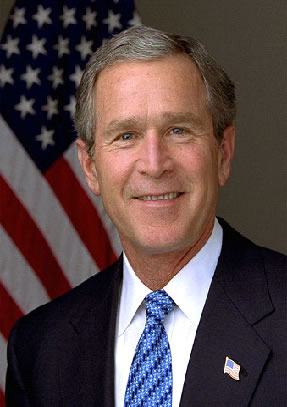 |
George W. Bush Born:
July 6, 1946 (age 65)
|
|
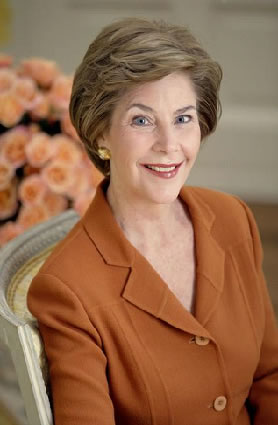 |
|
First lady: Laura Bush |
|
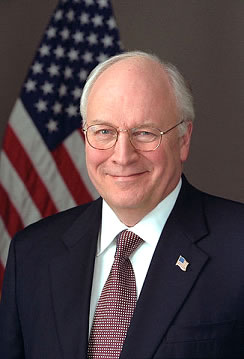 |
|
Vice-president: Richard Bruce «Dick» Cheney |
|
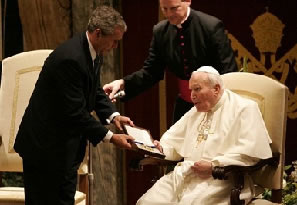 |
|
| Bush presents the Presidential Medal of Freedom to Pope John Paul II during a visit to the Vatican, June 2004 | |
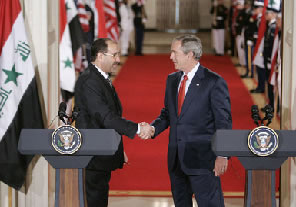 |
|
| Bush shakes hands with Iraqi Prime Minister Nouri al-Maliki | |
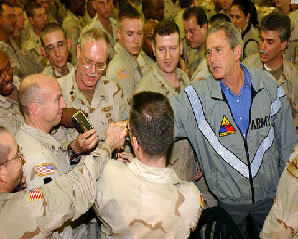 |
|
| Bush pays a surprise visit to Baghdad International Airport, November 27, 2003. Bush's popularity was still relatively high at that time. | |
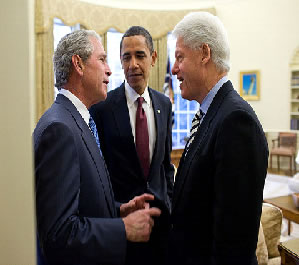 |
|
| Bush, Obama, and Clinton, January 2010 | |
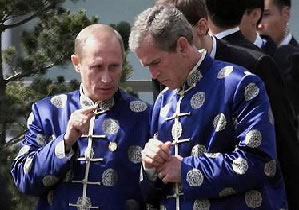 |
|
| Bush with Russian president Vladimir Putin, Shanghai, October 21, 2001 | |
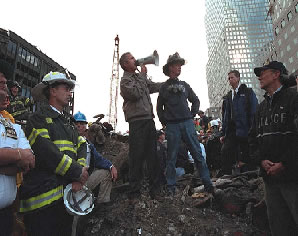 |
|
| Bush, standing with firefighter Bob Beckwith, addresses rescue workers at Ground Zero in New York, September 14, 2001. | |
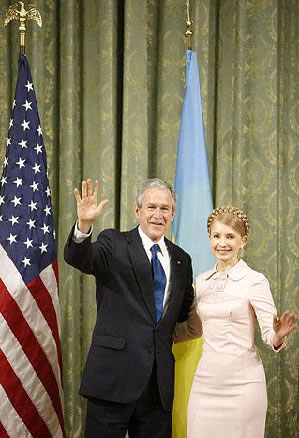 |
|
| Ukrainian Prime Minister Yulia Tymoshenko meeting with Bush on April 1, 2008 | |
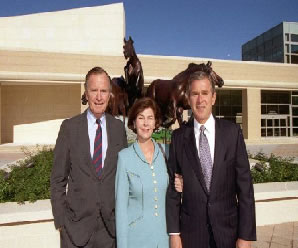 |
|
| PRESIDENT GEORGE H. W. BUSH AND PRESIDENT GEORGE W. AND LAURA BUSH... | |
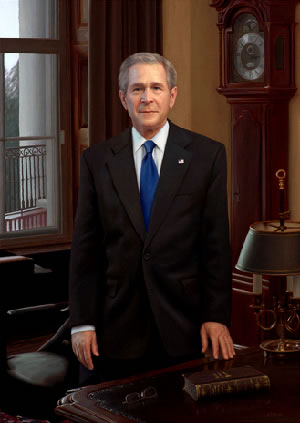 |
|
| George W. Bush |